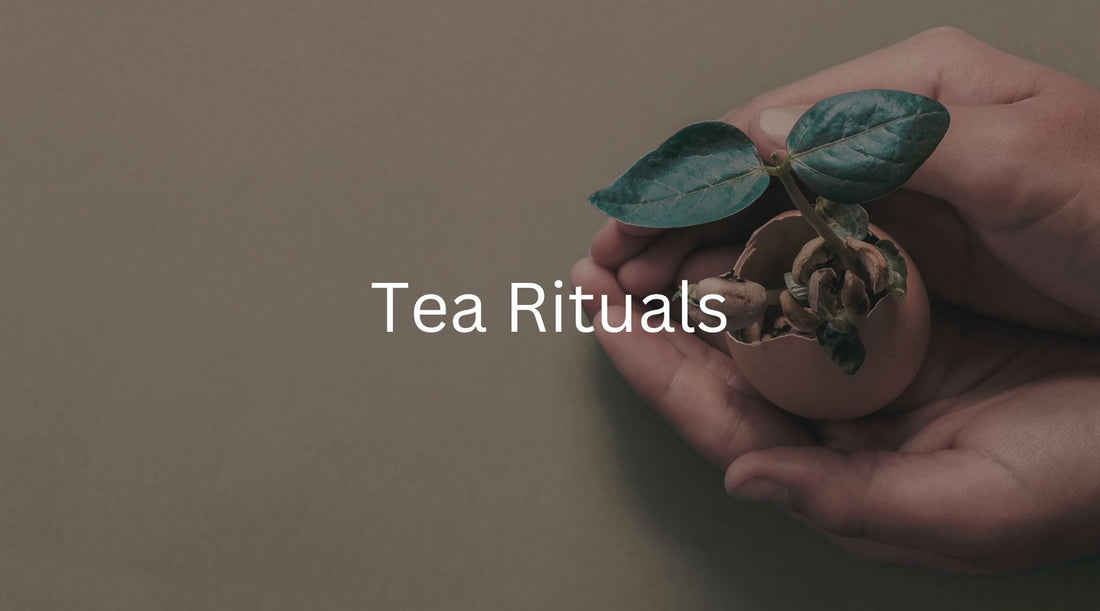In our fast-paced and demanding world, unending tasks and constant pressure can seriously harm our mental health. Anxiety disorders affect millions of people worldwide, and the high-stress lifestyle of modern society only exacerbates the problem.
Prolonged stress can lead to a weakened immune system, chronic headaches, digestive issues, and even cardiovascular problems. And when left untreated, anxiety disorders can cause debilitating symptoms such as panic attacks, obsessive thoughts, and social anxiety.

For centuries, humans have used tea as an occasion to slow down, reflect, and regroup during difficult times. There’s a reason the Brits are famous for rushing for the teakettle at the first sign of trouble.
The warmth and comfort of a freshly brewed cup of tea can help ease your mind and relax your body. By incorporating a daily tea ritual into your routine, you can create a moment of stillness and tranquility that can help you manage things anxiety and stress.

Tea Rituals
Many cultures have developed tea rituals or ceremonies that honor certain occasions. The Japanese have a long tradition of formal and informal tea rituals, many of them daily practices that promote good health and connection with others.
Tea rituals are a great way to create a sense of routine and structure in your day. They can provide a moment of mindfulness, where you can focus on the present moment and let go of worries about the future or the past.
Many teas such as chamomile, blue vervain, and ashwagandha contain natural compounds that have been shown to have a calming effect on the mind and body. By drinking tea regularly, you can benefit from these natural compounds and support your overall mental and physical health.

How to Start Your Tea Ritual
You can begin by selecting a tea that you enjoy and setting aside a specific time each day to enjoy it. Many like to start their day with a hot cuppa, or wind down in the evening with a soothing herbal blend. And afternoon tea has been a tradition in Europe for centuries.
Although some traditional tea rituals are highly structured, your practice can be as casual or precise as you like. Japanese tea ceremonies often include very specific tableware and décor such as hanging scrolls and flower arrangements. We can take inspiration from this practice even in spaces that aren’t quite so formal.
Find a relaxing space that you enjoy and surround yourself with the things that will enhance your experience. Use your favorite cup, or sit by a window with natural light. You can even set up an area in your home as a designated tea station.
By making a tea ritual part of your daily routine, you can create a sense of stability and consistency that can help you manage anxiety and stress in the long term. Below are a few ideas to make a tea ritual an intentional moment in your everyday life.
Mindfulness
Although meditation and mindfulness are closely linked, it’s important to note that there are many ways to be mindful without practicing traditional meditation. You may want to listen to a guided meditation recording or sit quietly and clear your mind, but many of us find that our minds don’t want to settle down when a million problems are knocking on our door.
You can be mindful simply by making an effort to notice the details around you while you enjoy your tea.
Deep Breathing
Breathing exercises are a good way to engage the parasympathetic nervous system, which brings more oxygen to our brains and lets our body know that we are safe and no longer in fight or flight mode. Many health organizations recommend the 4-7-8 breathing exercise described below. Make sure you are sitting comfortably before you begin.
Inhale deeply through the nose as you count to four, hold your breath for seven counts, and then out through the mouth for the count of eight. It may take a little practice, but the long exhale is an important way to let your body know it is safe and regulated.
Stretching
We spend a lot of hours of our day seated in front of screens, which can cause discomfort and chronic pain after time. Your tea ritual might include some much-needed physical movement. You might take time to practice a few gentle yoga poses, or simply stretch your arms and do a few head rolls. Anything that feels like it loosens or relaxes the parts of your body that are holding tension will go a long way toward adding some calm into your day.
Journaling
Your tea ritual might include putting pen to paper, engaging your body and mind in a journaling or drawing session that can help work out the stresses and anxieties of the moment. Adult coloring books have become widely available in recent years, allowing us to return to the state of creativity and focus we encourage in children but that is difficult to find as adults.
Just don’t forget you have hot tea sitting nearby as you get lost in the page!
Games and Puzzles
Although we often aim to separate our mental space from our smartphone and computers, there’s room to be flexible. Perhaps this is a good time for you to recharge by pondering a crossword, sudoku, or other fun puzzles. This can be the perfect way to wake up your brain and feel focused as you begin your day, or recharge to get through a long afternoon.
Options
When it comes to picking the right tea for the right moment, it is really up to your preferences. However, we recommend if you want a relaxing moment to unwind, stay clear of caffeinated teas. Our Bear Hug and Reishi Realms are perfect for an afternoon and evening.
If you like something lighter and spirited, try our Time to Smile, Happy Hibiscus, or Perky Tea (this one has a little caffeine from white tea).
For a great bedtime tea, or a tea for a moment of stress and anxiety, try our Cozy Chamomile. It’s formulated with powerful herbs to help with mental stress.
Precautions
Persons with allergies to other members of the Asteraceae family should exercise caution with chamomile. The infusion should not be used near the eyes. We recommend that you consult with a qualified healthcare practitioner before using herbal products, particularly if you are pregnant, nursing, or on any medications.

